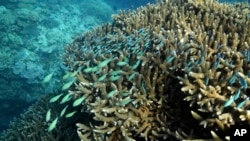Australian scientists said Wednesday that they had found a widespread decrease in coral cover in southern parts of the Great Barrier Reef.
Researchers have just completed a routine annual underwater survey of reefs off central Queensland state a month after their analysis showed similar devastation in a northern section.
The Australian Institute of Marine Science, a government research agency, said most of the damage it found in northern and southern sections of the Great Barrier Reef during the survey was the result of coral-bleaching warmer ocean temperatures.
The Great Barrier Reef off northeastern Australia is the world’s largest coral system. It is roughly the size of Italy or Japan.
Along with climate, tropical storms and infestations of coral-eating crown-of-thorns starfish are also blamed for the coral loss.
Mike Emslie, who runs the institute’s Long Term Monitoring Program, told VOA that "more than a third of the coral around Cooktown-Lizard reefs have been lost since last summer and, similarly, on the southern Great Barrier Reef, we have recorded a 40% decline in coral cover, which is one of the measures we use to indicate reef health of the Capricorn-Bunker group.”
The institute’s Long Term Monitoring Program has been running for four decades and examines key indicators of coral health. Researchers survey about 70 so-called core reefs off northeastern Australia each year.
Campaigners say the latest underwater survey results have shown "unprecedented coral losses."
The Australian Marine Conservation Society, a charity, said in a statement Wednesday that the Great Barrier Reef faces “another summer from hell with heat already building up in the water and coral bleaching warnings for much of the northern reef.”
Society Great Barrier Reef campaigner Simon Miller told VOA that it’s part of a global pattern affecting reefs around the world.
“This most recent mass bleaching event was also part of a global mass bleaching event - the Caribbean, in particular, and coral reefs around Florida were extremely badly affected by marine heat waves and by a mass bleaching event that led to really high levels of mortality earlier this year,” Miller said.
Warmer seas cause bleaching, forcing the coral to expel the microscopic symbiotic algae that give it most of its energy and color.
Reefs can recover from bleaching, but it can take years. If water temperatures do not return to normal, the coral can die.




